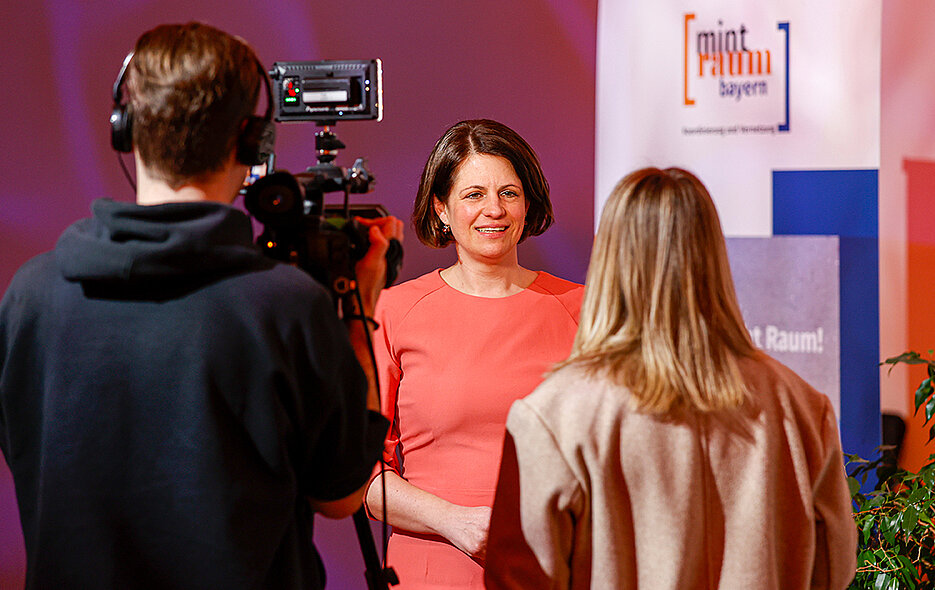From Würzburg to the World
06/28/2024There are still more men than women in STEM subjects - despite years of intensive efforts to change this. JMU alumna Susanne Knotzer explains why this is the case.

What do graduates of Julius-Maximilians-Universität Würzburg (JMU) do for a living? To introduce students to different perspectives, Michaela Thiel regularly interviews selected alumni. She is the managing director of the central alumni network "Uni Wü Community".
This time, Susanne Knotzer answered her questions. She studied Geography in Würzburg and Hanover with a minor in Business Administration and Spatial Planning. Her career path led her via location marketing for the Mainfranken region to the Initiative Junge Forscherinnen und Forscher e.V. (IJF), which is active throughout Bavaria. The aim of the IJF is to strengthen the networking and visibility of extracurricular STEM programmes for school pupils in Bavaria. STEM stands for Science, Technology, Engineering, and Mathematics.
Mrs Knotzer, why is it that there are still more boys than girls in STEM subjects?
We are convinced that girls and boys are equally interested in STEM subjects. However, research by Professor Heidrun Stöger from the University of Regensburg, for example, shows that the influence of family and friends, and even friends of friends, plays a role in personal decisions. If there are too many clichés and old role models being practised, a little more courage is needed and, above all, the opportunity to come into contact with STEM. This is where the IJF comes into play with its needs-orientated programmes, which can break down such gender-specific career choice clichés.
What advice would you give to parents who want to get their children interested in STEM subjects?
This is a question to which we at the STEM Coordination Centre for Bavaria have recently come up with a simple answer: Parents should use our discovery map. At www-mint-bayern.de, we are gradually making all of Bavaria's extracurricular STEM providers visible so that they can be filtered by subject or place of residence. At the same time, we are bundling all portals that offer STEM internships, useful information for teachers and much more. Dear parents, let your children try things out, tinker, have fun and discover their own strengths in the process! There are technology courses, school labs, children's universities, STEM museums, research fairs, science centres, extracurricular learning locations with educational support and even relevant games or kits. Get to the bottom of exciting everyday questions together with your children and get them excited about STEM at the same time!
What do you love most about your job?
In the STEM world, there is a high level of commitment and a strong desire to positively shape the future for and with the younger generations. STEM is also not an industry in the strict sense, so I get to network with very different players. In all areas, there are exciting approaches, important aspects and valuable knowledge about how young people can be taught future skills and how we can all learn from each other. Last but not least, I like working with people, the impact that joint action has on society in a positive way.
What did you particularly like about your degree programme?
Studying geography brings you into contact with the professional world at an early stage. This sharpens your view of what you would like to do later on. Excursions in physical geography bring students into contact with nature and the natural sciences or research. In contrast, excursions to companies focus on understanding the economy and its interrelationships. But contact with fellow students who have opted for a teaching degree in geography also shows the whole range of possibilities. What I didn't realise at the time: I also dealt with STEM topics throughout my degree programme. Whether it was the climate crisis, the mobility transition or digitalisation: these were all topics during my studies. Today, I realise that STEM education is the basis for being able to master the challenges of today in a self-determined way.
What can you use from your degree programme for your career?
I can actually use some of the things I learnt during my studies for my career. However, it's not so much about specific formulas or facts. It's more about the attitude to acquiring knowledge, skills in dealing with knowledge transfer and networking. And, of course, an understanding of spatial relationships, structures and dynamics. STEM in particular is about key skills for the working world of tomorrow, including communication skills, transferring knowledge to other areas and solution-orientated thinking. So I use the methods I learnt during my studies on a daily basis.
What was your path into the professional world like?
It was actually very easy, thanks to the intensive alumni relations of my faculty in Hanover. There was a so-called Geographical Salon for prospective graduates - an evening lecture where students came together voluntarily and gave talks on current topics. This was a platform to present themselves, make contacts and get to know the requirements of the labour market through direct exchange. In turn, the alumni were able to use this opportunity to recruit young talent. As a result, I had a signed employment contract before my last final exam had taken place. In addition, there is a large alumni meeting every two years, to which I am still invited after more than 20 years and which I regularly attend.
Thank you very much for the interview.
Are you not yet a member of the alumni network "Uni Wü Community" or Alumni & Friends e.V.? Then you are cordially invited to register via the alumni website! There you will also find the previously published interviews with JMU alumni and alumnae.








